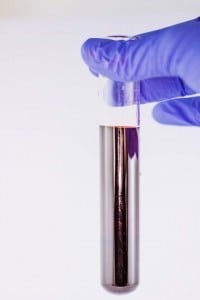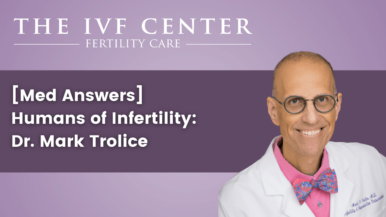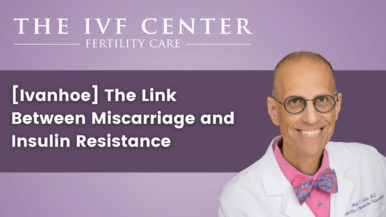What Are Some of the Best Infertility Treatment Options?
Infertility issues impact close to 7 million women in America, but infertility doesn’t discriminate between men and women. In roughly 40% of infertile couples in the U.S., the male partner is either the sole cause or a contributing cause of infertility.
“Of the thousands of patients I’ve treated over the years, we spend the most time talking about the best infertility treatment options available for those challenged trying to have a baby,” says Mark P. Trolice, M.D., board certified reproductive endocrinology and infertility specialist and founder of The IVF CenterSM. “Today more than ever, (infertility) options are very exciting and much more successful than in the past.”
Intrauterine insemination (IUI)
One of those options includes either ovulation induction (OI) or controlled ovarian hyperstimulation (COH), which is combined with intrauterine insemination (IUI).
“One of the very simple measures that we (employ) is fertility medications to increase a woman’s chances of releasing more than one egg, and then combine this with IUI where we put your partner’s sperm into a little catheter and then pass it into your uterus,” says Dr. Trolice.
Fertility medications allow a woman to better prepare her ovarian follicle for ovulation and/or to stimulate an increased number of eggs that will be exposed to sperm and thereby increase a woman’s chances of conceiving.
The sperm is washed and concentrated and then inserted into the upper uterine cavity during ovulation. IUI is done through the vagina, therefore circumventing the cervix, which allows a greater number of healthy sperm to be placed near the fallopian tubes, the usual site of fertilization. This procedure is done in the doctor’s office and no anesthetics are needed.
In Vitro Fertilization (IVF)
 “Another technique that we (employ) is called in vitro fertilization (IVF),” says Dr. Trolice. “Much more advanced but also much more successful: we remove eggs from the woman’s ovaries, add the partner’s sperm, create embryos, and then transfer those back into the woman’s uterus.”
“Another technique that we (employ) is called in vitro fertilization (IVF),” says Dr. Trolice. “Much more advanced but also much more successful: we remove eggs from the woman’s ovaries, add the partner’s sperm, create embryos, and then transfer those back into the woman’s uterus.”
IVF is a cutting-edge assisted reproductive technology (ART) that has been helping women and couples defeat infertility since 1978.
IVF treatment can help couples who display the following:
- Low sperm counts
- Endometriosis
- Damage to the uterus or fallopian tubes
- Ovulation irregularities
- Sperm unable to penetrate or survive in the cervical mucus
- Other health or unexplained reproductive issues
At The IVF Center, our IVF success rates consistently beat the national averages. Click here to see our success rates and what patients are saying.
Reproductive Surgery
“Some other things that we can do based on your individual situation is surgery,” says Dr. Trolice. “(Reproductive surgery) can involve your fallopian tubes if they’re blocked, fibroids or other abnormalities inside your uterus, or conditions that would impair your fertility involving the ovary.”
For women, reproductive surgery can also address:
- Tubal obstruction
- Endometriosis
- Scarring in the ovaries or around the pelvis stemming from conditions such as pelvic inflammatory disease (PID)
For men, reproductive surgery may help alleviate conditions such as:
- Varicocele (varicose veins of the testes)
- Obstruction along the reproductive tract
With the increased success and effectiveness of today’s infertility treatment options, Dr. Trolice is more passionate and excited than ever to share the benefits with his patients.
“This is an excellent time to pursue your fertility and be empowered,” he says.






